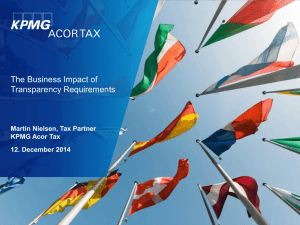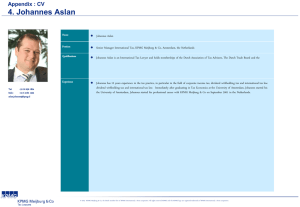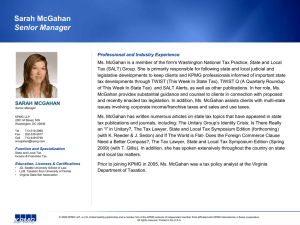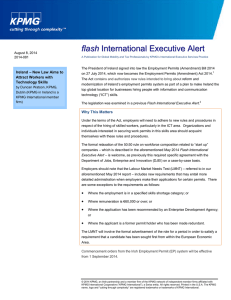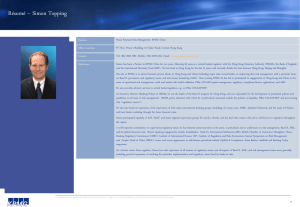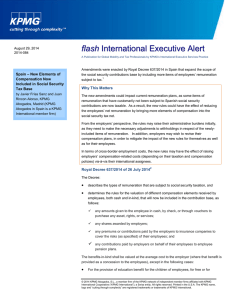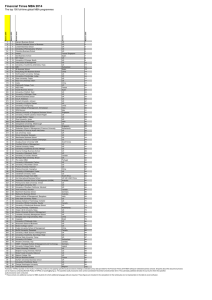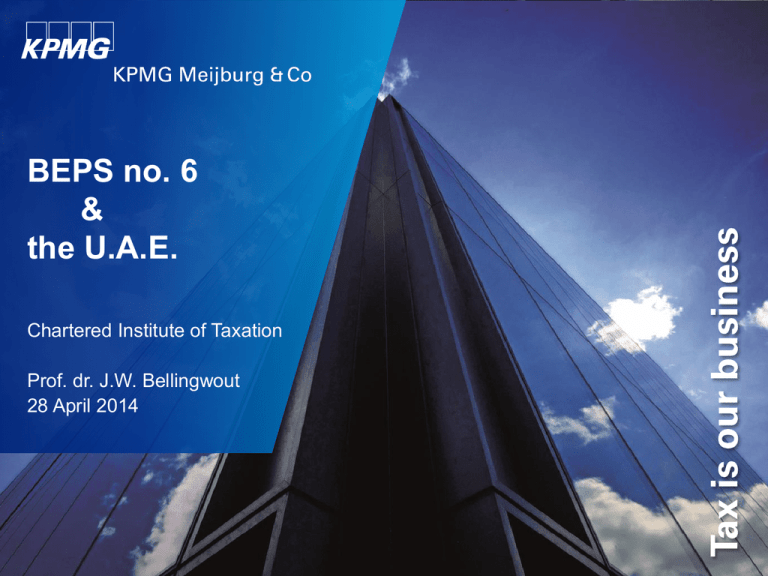
BEPS no. 6
&
the U.A.E.
Chartered Institute of Taxation
Prof. dr. J.W. Bellingwout
28 April 2014
BEPS & UAE
• The UAE:
OECD/BEPS is about ‘base erosion and profit shifting’
As a zero tax jurisdiction – no ‘base erosion’ in the UAE itself
Does the UAE play a role in eroding the tax base of other jurisdictions?
• BEPS no 6:
About ‘tax treaty abuse’
Main focus on low WHT rates on dividends, interest and royalties
But much broader scope of proposed anti-avoidance measures
• Will BEPS no. 6 do any harm to the UAE’s tax treaty network?
• Is the UAE’s position as a zero (corporate) tax jurisdiction at stake, in light of BEPS?
• Impact analysis:
- inbound investments into the UAE
- outbound investments out of the UAE
- flow-through activities into/out of the UAE
2
© 2014 KPMG Meijburg & Co, Tax Lawyers, is an association of limited liability companies under Dutch law and is a member of
KPMG International Cooperative ("KPMG International"), a Swiss entity. All rights reserved.
Corporate income tax as a starting point
• Why do countries levy a corporate income tax (CT)?
- Arguments, Old & New
• Complementary function
- vis-à-vis personal income tax (PT) levied from individuals
- CT as a whole: an anti-avoidance measure to safeguard PT levied from entrepreneurs
- this argument is more valid for family owned companies than for listed MNEs
• Fiscal budget
- the simple need of tax collections to finance the country’s expenses
- CT collections are relatively small: 3% of GDP in OECD (NL: < 2%)
- NL: CT<10% of total tax collections (PT and VAT account for 66%)
• Psychological reasons: ‘integrity of the tax system as a whole’, feelings about ‘fairness’
- “why would I pay tax, if big multinationals don’t?”
- the role of NGOs, some MPs, internet and the media
• International (G8/20, OECD, EU) Tax Standards:
- implicit pressure on jurisdictions to levy a CT?
3
© 2014 KPMG Meijburg & Co, Tax Lawyers, is an association of limited liability companies under Dutch law and is a member of
KPMG International Cooperative ("KPMG International"), a Swiss entity. All rights reserved.
CT & Some Old Unsolved Problems
• Who pays for the CT: the company or its customers?
- Milton Friedman knows the answer
• And if CT is passed on by the company to its customers
- does that include CT on all profits
- or only CT on predictable profits from routine functions, and not CT on residual profits?
• In other words, would it not make theoretical sense
- to exempt routine profits from CT
- to only tax residual profits, i.e. in excess of a remuneration for routine functions?
• In practice it is the other way around:
- jurisdictions tend to be successful in taxing routine functions
- MNE’s have been successful in avoiding/ deferring tax on residual profits
• Pragmatic view on OECD/BEPS policy:
- BEPS is mainly about avoiding tax on residual profts
- but perhaps the OECD needs to be more pragmatic, and focus on taxing routine profits only
- Dutch example of ‘box 3’ taxation (PIT)
4
© 2014 KPMG Meijburg & Co, Tax Lawyers, is an association of limited liability companies under Dutch law and is a member of
KPMG International Cooperative ("KPMG International"), a Swiss entity. All rights reserved.
CT & Some Old Unsolved Problems (continued)
• Legal reality, form over substance
- a company as a body corporate is a conceptual thing
- it exists because we believe it exists
- it can own assets, enter into contracts, assume risks, earn profits
• This legal reality can be manipulated
- ‘letterbox’ companies, special purpose vehicles
- IP companies, Finance companies, Holding companies,Securitization vehicles, Investment
Funds, etc.
- country of tax residence, functionality, level of entrepreneurial risk, allocation of profits
- it all started with looking at the legal reality only
- slowly on the way back by imposing substance requirements and imposing more economic
TP parameters (significant people functions – which can also be manipulated)
• Transfer Pricing (TP) as an example of how the opposite has been achieved
- US to increase its tax base by applying the a.a.l. principle
- but instead other jurisdictions suffer from increased expenses eroding their tax bases
- the corresponding income being allocated to entities in low tax jurisdictions
• BEPS tries to defend a Western World regime that is disfunctional and outdated
5
© 2014 KPMG Meijburg & Co, Tax Lawyers, is an association of limited liability companies under Dutch law and is a member of
KPMG International Cooperative ("KPMG International"), a Swiss entity. All rights reserved.
CT & Some Old Unsolved Problems (continued)
• International distortions due to lack of harmonization
- double taxation / double non-taxation
- mismatches in entity classification (transparent/non-transparent)
- mismatches in financial instrument classification (debt/equity)
- mismatches in permanent establishment thresholds and allocation of assets/income
- mismatches in timing of realization of profits/lossess
- mismatches in transfer pricing / at arm’s length criteria
- etc. etc.
• Tax Competition between jurisdictions
- tax rates, tax incentives
- deliberate mismatches to achieve double non-taxation
- in order to attract foreign businesses/ business functions
• Are the corporate taxpayers to blame?
Can companies that benefit from international mismatches and companies that benefit from
jurisdictions that actively invite these businesses to make use of incentives and deliberate
mismatches, be accused from immoral behaviour / agressive tax planning (ATP)?
- this is why BEPS and the EU action plan against ATP not only focus on taxpayers but also
on jurisdictions with harmful tax regimes
6
© 2014 KPMG Meijburg & Co, Tax Lawyers, is an association of limited liability companies under Dutch law and is a member of
KPMG International Cooperative ("KPMG International"), a Swiss entity. All rights reserved.
Dividend vs. Interest & Royalties
Country R
I
Country R
ParentCo
II
GroupCo
+
Country S
Dividend
Interest
Royalties
WHT
WHT
Country S
OpCo
OpCo
-/Profit
Profit
7
© 2014 KPMG Meijburg & Co, Tax Lawyers, is an association of limited liability companies under Dutch law and is a member of
KPMG International Cooperative ("KPMG International"), a Swiss entity. All rights reserved.
Treaty Shopping
Country R
Country R
Top Co
Top Co
DividendWHT (0, 5, 10%)
Interest
Royalties
Dividend
Interest
Royalties
WHT (20, 25, 30%)
No tax treaty or
Sub optimal tax treaty
NL
No WHT
NL Co
Dividend
Interest
Royalties
Op Co
WHT (0, 5, 10%)
Op Co
Tax treaties: “Resident”, “Beneficial owner”, LOB (US), MPT
Country S
Country S
8
© 2014 KPMG Meijburg & Co, Tax Lawyers, is an association of limited liability companies under Dutch law and is a member of
KPMG International Cooperative ("KPMG International"), a Swiss entity. All rights reserved.
Treaty shopping & UAE ?
• What has the UAE to do with this?
• Zero tax jurisdiction – but not a tax haven
• Tax treaties: to avoid double taxation
- in case of UAE: no double taxation
- inbound: Capital Import Neutrality: level playing field - foreign and local investors
- outbound: why would a UAE investor pay higher WHT in Germany than a Japanese
investor?
• UAE: a rapidly increasing tax treaty network
- more than 70 tax treaties (not all in force yet)
- beneficial for inbound (FDI) & outbound investments
- a ‘must have’ in terms of economic infrastructure
- reputation and respect as a jurisdiction
- level playing field, non-discrimination
- a basis for exchange of information
- provides certainty in case of future developments
9
© 2014 KPMG Meijburg & Co, Tax Lawyers, is an association of limited liability companies under Dutch law and is a member of
KPMG International Cooperative ("KPMG International"), a Swiss entity. All rights reserved.
BEPS no. 6 – Tax Treaty Abuse
• “Preventing the granting of treaty benefits in inappropriate circumstances”
BEPS no. 6, 14 March 2014
• Consultation document
- drafted at working party level
- not reviewed/blessed by CFA
- i.e. far from final version
- 78 responses received
- with a lot of criticism
• Tax Policy Considerations
- advising countries whether they should enter into tax treaties with certain jurisdictions
• New preamble of OECD Model Convention (OMC)
- not only to avoid double taxation
- but also to avoid double non-taxation (including tax avoidance / treaty shopping)
• Draconic measures to be included in OMC and existing tax treaties to prevent treaty
shopping
- Limitation on Benefits (LOB) provision
- General Anti Avoidance Rules (GAAR) / Main Purpose Test
- Specific Anti Avoidance Rules (SAAR)
- other measures (e.g. to abolish tie-breaker rule of Art. 4(3) OMC)
10
© 2014 KPMG Meijburg & Co, Tax Lawyers, is an association of limited liability companies under Dutch law and is a member of
KPMG International Cooperative ("KPMG International"), a Swiss entity. All rights reserved.
BEPS no. 6 - measures against treaty shopping - LOB
• Limitation on Benefits (LOB)
- ownership test, or
- active trade or business test
Country R
.
Top Co
• Ownership test / extremely difficult to satisfy:
- HQ of listed companies + subsidiaries
located in the same country as the HQ
- other companies if owned by qualifying
persons resident in the same country
DividendWHT (0, 5, 10%)
Interest
Royalties
NL
• Active trade or business (TB) test:
- only income in connection with TB
- investment funds: no active TB
- volume of TB should be substantial in
relation to TB in country S
No WHT
NL Co
Dividend
Interest
Royalties
Op Co
WHT (0, 5, 10%)
• Specific persons that always qualify:
- government, charitable, religious, scientific,
cultural, etc. bodies
• ‘Escape’: access to treaty benefits was not
one of the main purposes
• No ‘equivalent beneficiary’ escape
Country S
© 2014 KPMG Meijburg & Co, Tax Lawyers, is an association of limited liability companies under Dutch law and is a member of
KPMG International Cooperative ("KPMG International"), a Swiss entity. All rights reserved.
11
BEPS no. 6 - measures against treaty shopping - MPT
Country R
• In addition to LOB: MPT
.
• This main purpose test applies if:
Top Co
“one of the main purposes of any
arrangement or transaction”
Dividend
Interest
Royalties
WHT (20, 25, 30%)
No tax treaty or
Sub optimal tax treaty
is to obtain a treaty benefit for an item of
income resulting from such arrangement
or transaction
• Example: bank & dividendstripping for
non-resident clients
Op Co
• Huge level of uncertainty
Every transaction to be monitored
Huge administrative burden
Combination with LOB is too much
Country S
12
© 2014 KPMG Meijburg & Co, Tax Lawyers, is an association of limited liability companies under Dutch law and is a member of
KPMG International Cooperative ("KPMG International"), a Swiss entity. All rights reserved.
BEPS no. 6 - Impact on UAE
Outbound
Inbound
• UAE based investors
- investing in a source country
- without a tax treaty
- currently route this investment via
another country –> treaty shopping
• Foreign based investors
- investing into the UAE
- without a tax treaty
- currently route this investment via
another country -> treaty shopping
• BEPS no. 6 - if adopted - will make this
impossible
• BEPS no. 6 - if adopted - will make this
impossible
• This will increase foreign tax burdens on
UAE based investors
• This will increase foreign tax burdens on
foreign based investors
• Clearly the message is: to invest directly
out of the UAE in the source country
• Clearly the message is: to invest directly
into the UAE out of the investor’s country
• Therefore, the UAE will become more
dependent on its own tax treaty network
with relevant source countries
• Therefore, the UAE will become more
dependent on its own tax treaty network
with relevant investors’ countries
13
© 2014 KPMG Meijburg & Co, Tax Lawyers, is an association of limited liability companies under Dutch law and is a member of
KPMG International Cooperative ("KPMG International"), a Swiss entity. All rights reserved.
BEPS no. 6 - Tax Policy Considerations
• “Policy considerations that countries should consider before deciding to enter into a
tax treaty with another country”
• “...whether a tax treaty should be concluded with a State, but also (...) whether a State should
seek to modify (...) or even (...) terminate a treaty...”
• “Where a State levies no or low income taxes, the other States should consider whether
there are risks of double taxation that would justify (...) a tax treaty.”
• “States should also consider (...) their prospective treaty partners (...) the ability to exchange
tax information, this being a key aspect that should be taken into account when deciding
whether or not to enter into a tax treaty.”
• The UAE’s profile in light of these policy considerations?
- no income taxes (other than foreign banks)
- exchange of tax information (OECD Peer Review Phase 1: 24 April 2014 Supplementary
Report; Phase II to come)
14
© 2014 KPMG Meijburg & Co, Tax Lawyers, is an association of limited liability companies under Dutch law and is a member of
KPMG International Cooperative ("KPMG International"), a Swiss entity. All rights reserved.
BEPS no. 6 - a further impact on UAE
• Conclusion: increased importance of UAE’s own tax treaty network
• Strength:
- more than 70 tax treaties, which is good
- more tax treaties (with important jurisdictions) would even be better
• Weakness:
- the current tax treaties are often limited in scope in terms of beneficiaries
- absent a CT, many countries are not willing to grant full benefits to all UAE residents under
a tax treaty
• Threats:
- the policy considerations in BEPS no. 6 advise countries not to conclude or even terminate
tax treaties with zero tax jurisdictions
- is the UAE in danger here?
• What would be the most logical step to turn this into an opportunity?
15
© 2014 KPMG Meijburg & Co, Tax Lawyers, is an association of limited liability companies under Dutch law and is a member of
KPMG International Cooperative ("KPMG International"), a Swiss entity. All rights reserved.
Thank you for
your time!
All activities performed and all services rendered by
KPMG Meijburg & Co are subject to its general terms
and conditions, filed with the Amsterdam Chamber of
Commerce.
KPMG Meijburg & Co, Tax Lawyers, is an association
of limited liability companies under Dutch law,
registered under Chamber of Commerce registration
number 53753348 and is a member of KPMG
International Cooperative ("KPMG International"), a
Swiss entity.
The general terms and conditions are available on
the KPMG Meijburg & Co website
(http://www.meijburg.com/TermsAndConditions)
and will be supplied upon request.

